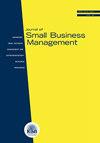回顾中小企业违约预测指标:Omega分数
IF 5.3
2区 管理学
Q1 MANAGEMENT
引用次数: 9
摘要
本文章由计算机程序翻译,如有差异,请以英文原文为准。
Revisiting SME default predictors: The Omega Score
ABSTRACT SME default prediction is a long-standing issue in the finance and management literature. Proper estimates of the SME risk of failure can support policymakers in implementing restructuring policies, rating agencies and credit analytics firms in assessing creditworthiness, public and private investors in allocating funds, entrepreneurs in accessing funds, and managers in developing effective strategies. Drawing on the extant management literature, we argue that introducing management- and employee-related variables into SME prediction models can improve their predictive power. To test our hypotheses, we use a unique sample of SMEs and propose a novel and more accurate predictor of SME default, the Omega Score, developed by the Least Absolute Shrinkage and Selection Operator (LASSO). Results were further confirmed through other machine-learning techniques. Beyond traditional financial ratios and payment behavior variables, our findings show that the incorporation of change in management, employee turnover, and mean employee tenure significantly improve the model’s predictive accuracy. Video Abstract Read the transcript Watch the video on Vimeo © 2022 The Author(s). Published with license by Taylor & Francis Group, LLC.
求助全文
通过发布文献求助,成功后即可免费获取论文全文。
去求助
来源期刊

Journal of Small Business Management
MANAGEMENT-
CiteScore
11.40
自引率
11.30%
发文量
48
期刊介绍:
The primary purpose of the Journal of Small Business Management (JSBM) is to publish scholarly research articles in the fields of small business management and entrepreneurship. As the official journal of the International Council for Small Business (ICSB), the JSBM is recognized as a primary instrument for projecting and supporting the goals and objectives of this organization, which include scholarly research and the free exchange of ideas. The journal, which is circulated in 60 countries around the world, is a leader in the field of small business research. The following is a list of research topics of interest to JSBM readers: -Family and Founders Owned Enterprises -Women and Minority Owned Enterprises -Small Business Strategy and Organization -Small Business and Entrepreneurial Marketing -Franchising and Small Business -Internationalization and International Entrepreneurship -Entrepreneurial and Small Business Education -New Venture Creation and Venture Capital -Small Business Finance and Accounting -Small Enterprise Governance and Agency -Small Business Technology and Innovation -Small Business Policy, Economics, and Legal Issues -Small Business Operations and E-Commerce -Small Business Assistance and Training Programs -Small Business Leadership and Entrepreneurial Behavior
 求助内容:
求助内容: 应助结果提醒方式:
应助结果提醒方式:


